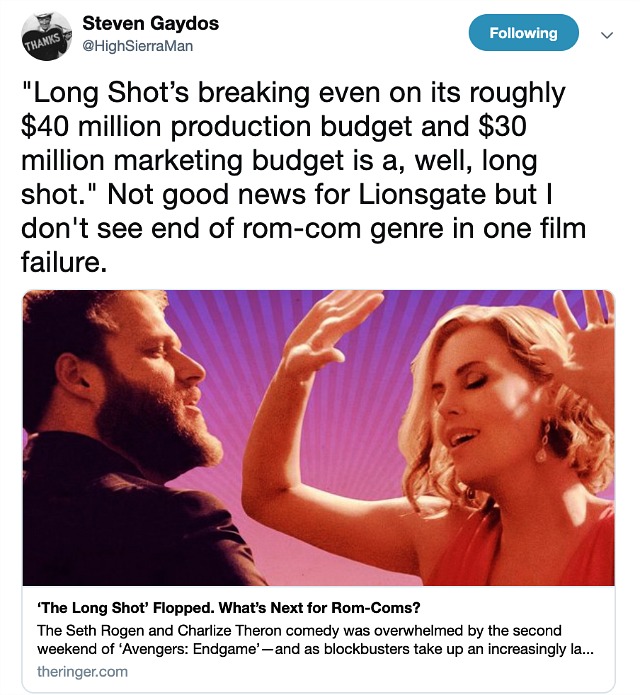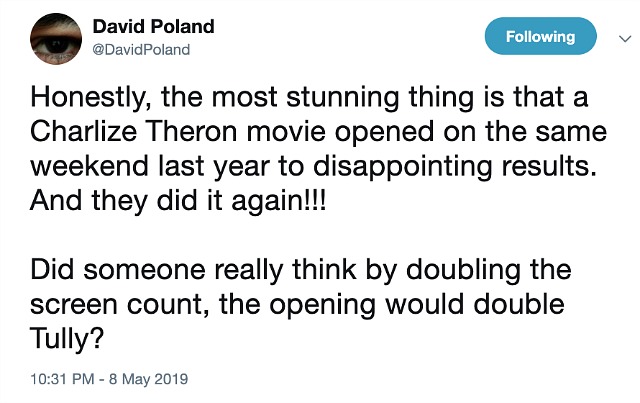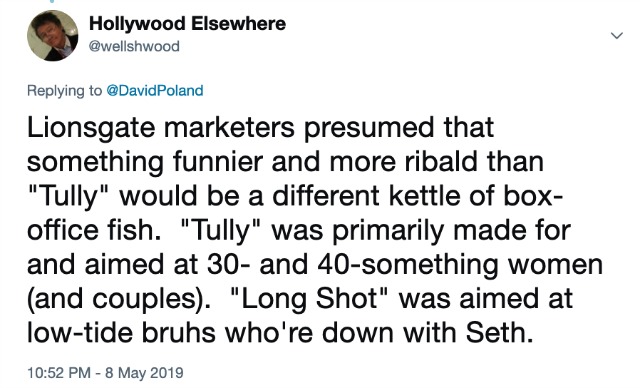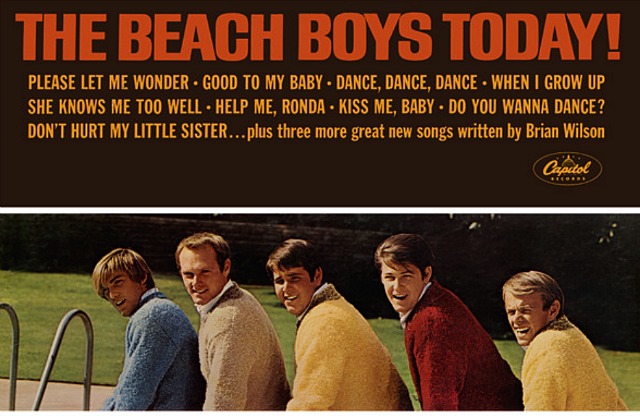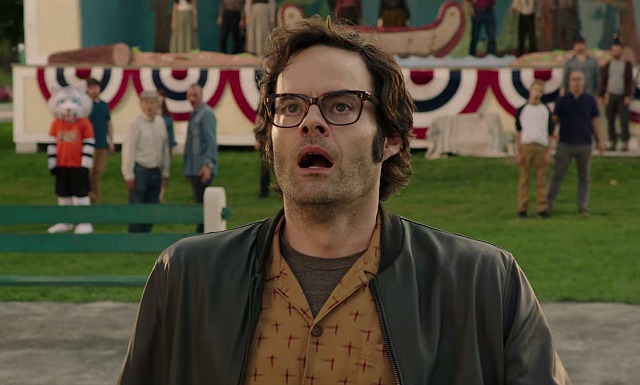The late Alvin Sargent was one of Hollywood’s finest and classiest 20th Century screenwriters, especially in the realm of adult relationship dramas. On the same level as Bo Goldman, William Goldman, Ben Hecht, Joseph L. Mankiewicz, David Rayfiel, Paul Schrader, Robert Towne, etc. Ordinary People was the peak, but the runners-up were The Sterile Cuckoo (’69), Paper Moon (’73), Julia (’77), Straight Time (’78, w/ Jeffrey Boam), Dominick and Eugene (’88), Hero (’92 w/ Laura Ziskin and David Webb Peoples) and Unfaithful (w/ William Broyles Jr. — ’02). Toward the end of his career Sargent wrote or co-wrote three or four Spider Man scripts. Alas, his kind of movie had fallen out of favor and paychecks were there for the taking.
 Jeffrey Wells
Jeffrey Wells
Premature Obit
If a film’s second weekend grosses are down less than 20%, it’s definitely caught on to some extent. That’s what Lionsgate’s Long Shot is managing as we speak — a “sweet hold of -18%, or $8M, for a 10-day total of $21.6M,” according to Deadline‘s Anthony D’Allessandro. Nothing to necessarily pop champagne over, but better than anticipated. HE hereby apologizes for a 5.9 box-office story that was titled “On The Death of Long Shot.” Everyone spoke a little too soon.
Legends Are More Fun
I’m sorry but this morning’s Variety story about veteran hotshots Jeff Sagansky and Harry Sloan launching Diamond Eagle Acquisition Corp. put me to sleep. “$400 million public offering, a means for investors to participate in new players in the media and digital sector”….wilt.
I’ve been reading trade stories about Sagansky since the early ’80s, and the only one that ever sunk in was unsubstantiated and most likely made up. Which is too bad.
The story concerned an alleged 1982 or ’83 meeting between Sagansky, at the time an NBC executive, and legendary director Fred Zinnemann (High Noon, From Here To Eternity, A Man For All Seasons, The Day of the Jackal). Those who told the story explained that Sagansky was a 31-year-old executive whippersnapper at the time, full of beans and ’80s attitude. So Zinneman walks into Sagansky’s office, they shake hands and sit down, and Sagansky says, “So, tell me about yourself!” And Zinneman replies, “You first.”
Earlier today I googled “Sagansky Zinnemann” and found nothing that verified the story. I tried to discover if Zinnemann had met with some other whippersnapper around this period…zip. But I distinctly remember the story kicking around.
Five-Hour Nightmare
Hollywood Elsewhere disappeared this morning due to the gentlemen geniuses at WP Engine, a cloud-linked ISP that I’ve been with since 2017. Five hours of simulated death due to the failure of a shared server + “miscommunications” + largely incompetent WP Engine staffers who did absolutely nothing to improve the situation for hours on end.
WP Engine tried to explain the problem with a lot of bullshit techno-jargon.
While fretting and whining I came upon an eye-opening essay by internet marketer Matthew Woodward, titled “Why Your Business Must Avoid WP Engine At All Costs.” Woodward knows whereof he speaks, and he’s convinced that they’re really bad news.
One way or another I’m separating myself from WP Engine at the first available opportunity. Hollywood Elsewhere has suffered through the usual issues and outages over the years, but the site has never been unconscious for a five-hour stretch. On top of which these jerks tripled their monthly fee from $99 plus overages to $300 last January, and that was for putting me on a shared server with 100 other clients.
I love that this happened a day before leaving for France. And I haven’t begun to pack yet.
Woodward is advising alienated, WordPress-using WP Engine clients to sign up with a Bulgaria-based ISP called WPX Hosting. They have a server in Chicago but they won’t offer phone chats of any kind, even in an emergency.
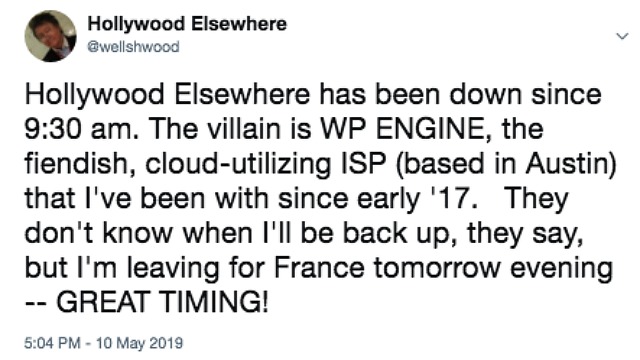
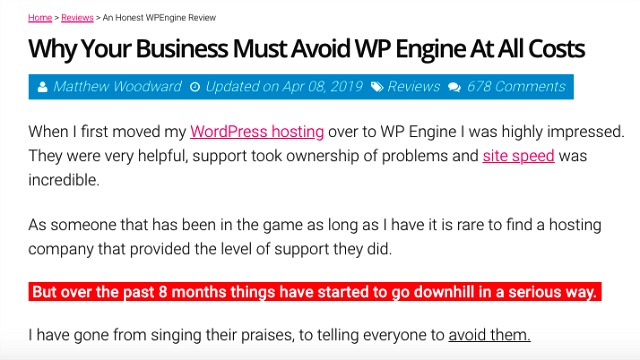
Songbird With Broken Wing
Is Renee Zellweger doing her own singing here?” Because the singer (whoever it is) sounds only vaguely like Judy Garland. Even a withered version. Does anyone know anything? I’ve read nothing.
Garland was only 47 when she died on 6.22.69. She looked like she was nudging 60.
Boilerplate: “An adaptation of the Olivier- and Tony-nominated Broadway play End of the Rainbow, Judy is an upcoming British-American biographical musical-drama film directed by Rupert Goold. It’s based on the life of American singer and actress Judy Garland, focusing on the late 1960s as she arrives in London for a run of sell-out concerts at the Talk of the Town. Zellweger as Garland; Rufus Sewell and Michael Gambon in supporting roles.
“Principal photography for the film began on 3.19.18, in London. The film will be distributed in the UK by Pathé, and in the US by Roadside Attractions and LD Entertainment. The film will be released in the US on 9.27.19.”
Clear Sailing for Kechiche’s “Intermezzo”
As Hollywood Elsewhere will depart the Cannes Film Festival at midday on Friday, 5.24, I was concerned by Thierry Fremaux’s 5.1 statement that Mektoub My Love: Intermezzo, the four-hour, sexually frank Abdellatif Kechiche film, would screen at the tail end of the festival “so the DCP has time to get there.”
Most of us presumed that the first showing would happen on Friday, 5.24 — a no-go pour moi.
Well, the press and public screening schedules appeared online a few hours ago, and the first press screening of Intermezzo will be on Thursday, 5.23 at 10 pm. Obviously a tough screening (breaking at 2 am) but good news all the same.

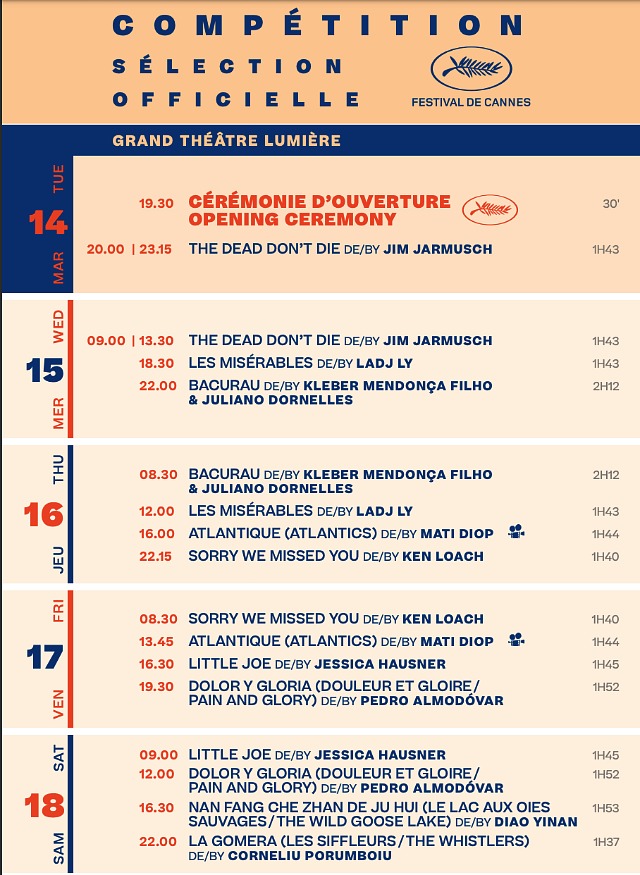
Aladdin Sane
Disney and Guy Ritchie‘s live-action Aladdin had its big premiere in Paris last night. Several critic friends (myself included) have received invites to an all-media screening on Tuesday, 5.21, at the Hollywood Arclight, or 12 days hence. Three days later it opens worldwide. The rub is that a good majority of the top-tier critics will be in Cannes that day so the second-stringers will have a field day.
Note from Disney publicity: “In order to give audiences around the world the opportunity to enjoy our movies to the fullest and allow them to discover any surprises and plot twists, we respectfully ask that you as press refrain from revealing spoilers and detailed story points in your coverage, including on social media. The official review embargo is Wednesday, May 22nd at 6 am Pacific.”
Critic friend: “Yeah, I’ll bet a live-action mixed with CG film that essentially exists to duplicate a 25-year-old animated film is full of plot twists & surprises.”


Shouldn’t Take It So Hard
A couple of days ago I happened to listen to Jimmy Webb and Richard Harris‘s “MacArthur Park.” It was quite the innovative single in the spring of ’68, and I still like the complex orchestration (or at least portions of it). But it hasn’t aged well. It feels too precious and weepy and forlorn.
It’s based on a shattered affair Webb had when he was 19 or 20. The girl worked in an office building near MacArthur Park, and they used to meet there for lunches or something. Some of the things Webb noticed at the time (the melting green cake icing, old men playing checkers) went right into the song.
But it sounds a little stodgy now, and Harris’s singing is labored — he’s pushing too hard and a bit outside his range.
In 1992, Miami Herald humorist Dave Barry conducted a poll among his readers, and they selected Harris’s recording as the worst song of all time, both in terms of “Worst Lyrics” and “Worst Overall Song”.
Barry: “It’s hard to argue with this selection. My 12-year-old son, Rob, was going through a pile of ballots, and he asked me how ‘MacArthur Park’ goes, so I sang it, giving it my best shot, and Rob laughed so hard that when I got to the part about leaving the cake out in the rain, and it took so long to bake it, and I’ll never have that recipe again, Rob was on the floor. He didn’t BELIEVE those lyrics were real. He was SURE his wacky old humor-columnist dad was making them up.”
But “MacArthur Park” reminded me of one serious, real-deal thing, which is that young people (late teens, early 20s) don’t deal well with romantic break-ups, as a rule.
I certainly didn’t. Whenever it happened I would collapse into a puddle. And it was almost always me getting dumped and not the other way around. (The same seemed to happen with Jett at that age.) After an especially painful jilting I remember being in my ex-girlfriend’s kitchen late at night (she was attending Marlboro College in Vermont while I was staying in a converted chicken coop on her parent’s spread) and just weeping my ass off.
The first time I dropped someone was in ’79, and I recall feeling really, really badly about it. But I had to because I’d fallen in love with someone else, and it felt like the real deal. (Plus she was sexy and super-smart) That “someone else” dumped me four or five months later. Life is a comedy written by a sadist.
Last “Loudest” Trailer
The Loudest Voice won’t be on Showtime until 6.30 (a little more than seven weeks hence), and I’d really like to see it sooner. As in right now or, you know, this weekend. You can tell Russell Crowe is obviously feeling his madness oats as Roger Ailes. Showtime must be sending links to critics by now. I haven’t inquired, but here goes…
Burgundy or Maroon
I know this is nuts. I know it’s irrational. I know there’s no reason the rest of the world thinks like this. I know this is just me and my private weirdness. But I have to add another item to my list of pet peeves, quirks, caprices, obsessions, superstitions and animal dislikes**.
So here it is: I hate people who wear maroon or burgundy-colored clothing — especially sweaters, sport jackets and scarves. Okay, I don’t “hate” people who wear maroon or burgundy, but I can’t fathom why anyone would want to wear such a horrid color and so the instant I see someone strolling around in a burgundy T-shirt or wearing maroon socks, I’ll mutter to myself, “The fuck is wrong with that guy?”
I’ll never “say” anything, mind. I keep it to myself or write about it, but I’ll never go up to some maroon-wearer and actually make a crack or something. I always keep that shit holstered.

I’ve hated maroon sweaters ever since I first glanced at the cover of “The Beach Boys Today” and noticed that Brian Wilson (who was always kind of nerd when it came to apparel) was wearing one of these horrid things. I didn’t have to think about it. One look and I went “Jesus H. Christ.” From that moment I knew — I knew that maroon and burgundy were musts to avoid, and I didn’t know why or how or whatever. It was a gut call.
There are a lot of people with animal dislikes out there. Some people will just glance at you one time and say to themselves, “Okay, that’s it, I hate that guy.”
There are frothy-mouthed Twitter dogs who hate me today. They seethe and bark at the sound of my name. I don’t much like them either. But you know the difference between me and them? I keep it to myself, and I sure as hell don’t say “these guys should be hounded out of the business…don’t hire them or give them advertising!” I would never dream of tweeting something like that. No offense, but those who do this fall under the heading of “diseased scum.”
I can remember strolling into a mixed-company beer bar when I was in my early 20s, which is when I looked a bit feminine with my long hair and high cheekbones and slender features. And I just scanned the people sitting at the bar, and right away I spotted a guy who was giving me a look that said “oh, man, you’re fucking disgusting…I hate your ass….c’mon over and say something…I’ll punch your lights out,” etc.
This is how I feel about burgundy-maroon minus the physical threats.
I’m okay, however, with hand-crafted burgundy or cordovan lace-up shoes.
** People who take extra-long showers, people who shriek with laughter in bars and cafes, couples who obliviously block escalators or moving sidewalks, twenty- and thirtysomething Millennials who wear the same fucking outfit from coast to coast (baggy shorts, T-shirt, backward baseball caps, mandals or canvas slip-ons), the term “Portugese water dog,” people who can’t sing “Happy Birthday” on key, bar owners who won’t let me eat an innocent slice of pear cake as they’re stacking chairs and closing up shop, grandma types who would give my cowboy hat to the police, etc.
More Derry Horrors
27 years after the horrific events that took place in Derry, New Hampshire in 1989, the “Loser’s Club” — now in their late 30s — are back in the old town and looking to settle this nightmarish Pennywise shit (hauntings, spookings, self-reflections) once and for all.
Let me tell you something — if on the cusp of 40 you’re still seriously haunted or even psychologically imprisoned by your childhood traumas — if you’re seriously inhibited or impaired by bad shit that happened when you were nine or ten years old and you can’t seem to get past it, then you’ve got a serious problem on your hands. Most people get past their childhood shit, but here you are still frowning and fretting and grinding your teeth about it. The applicable terms are (a) arrested development and (b) pity party.
I for one don’t give a damn if you resolve your problems with Pennywise and the other bugaboos or not. You can all take a walk in a swamp
You didn’t have to be a megaplex moron to rave about the first It film, but it probably helped if you were. It (’17) was not a Hollywood Elsewhere film, and the same probably goes for the forthcoming sequel — It Chapter Two. The It films are for popcorn munchers — lowbrows who prefer their horror films to howl and jolt and gush blood and vomit in their laps.
And I love the fact that the there’s no colon or dash between It and Chapter Two on the poster — it’s like the filmmakers are shouting “hello, idiots…over here!”
On The Death of “Long Shot”
Jonathan Levine, Seth Rogen and Charlize Theron‘s Long Shot is a bust. After costing “roughy $40 million to make and another $30 million to market,” according to the N.Y. Times‘ Brooks Barnes, it made a lousy $10 million last weekend (it’s currently at $12 million) and will almost certainly suffer a 40%-or-higher diminishment during the next round (5.10 to 5.12).
The odds of tripling that opening weekend tally by the end of the run are not high. Face it — the movie was intermittently funny at best (I found it flat-out unfunny), the premise was absurd or at least distasteful (the toad-gazelle pairing of Rogen and Theron) and Joe and Jane Popcorn said “nope.”
No, wait — that’s not why it died. The handicappers are claiming that Long Shot sank beneath the waves because the competition from Avengers: Endgame was too fierce. So HE’s above-mentioned issues were incidental to its failure? I doubt it but you tell me.
Theory #1: Rogen is only 37 but he looks 49, and I’m wondering if the guy he’s been playing in film after film for the last 12 years (or since Knocked up) is starting to wear thin among his followers. I personally love the guy when he’s spouting impudent, sharp-edged dialogue, but his Long Shot character was a 16 year-old. Theory #2: It’s Charlize Theron‘s fault! The public accepts/respects her as a dramatic actress who takes chances, but is wary of watching her in a romcom mode. Theory #3: The movie blew chunks and the word got around. Theory #4 (see below): It’s Jon Feltheimer‘s fault!
